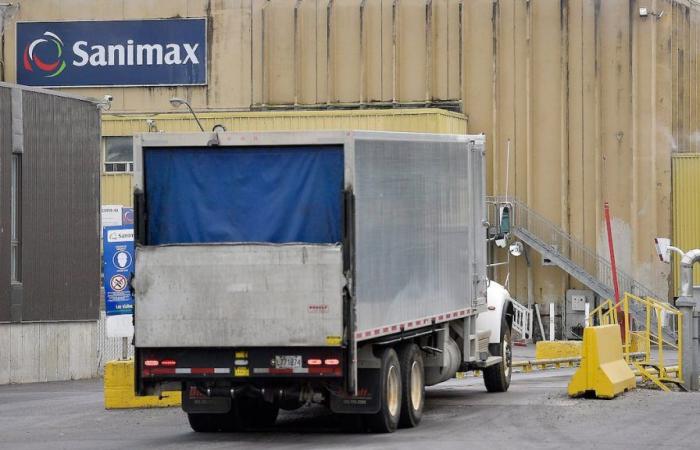Lévis Sanimax’s Sanimax Requarrying plant is hopeful of becoming a much better neighbor this summer thanks to a new interior storage system worth $ 10 million which has become operational in mid-March.
The company inaugurates its brand new garage on Monday equipped with a negative pressure treatment system as well as a biofilter in order to contain the fumes from animal carcasses which are awaiting treatment.
The objective is to limit bad smells, which were described “practically since the factory foundation” in 1939.
This new installation ends the loop of an action plan launched in 2022 aimed at controlling the program of odors developed in collaboration with the Ministry of the Environment and the Ministry of Agriculture, Fisheries and Food.
“Waiting for trucks outside in the heat wave has been identified as the largest emanation factor. These new installations are the measure that is most effective in improving cohabitation with the neighborhood, ”says the President and CEO of Sanimax, Martial Hamel, during an exclusive interview with The newspaper.
Lévis’s Sanimax factory director Yannick Cadotte believes that the latest -cry of the company of the $ 10 million will have a significant impact on nauseating fumes.
Photo Vincent Desbiens
Good neighborhood
He adds that it is essential for the company, which is at its 86e Year of existence, to “do everything in its power to be a good neighbor”, if it wants to last.
“We know that there will be no return on investment. On the other hand, when we think of the capacity to operate in the long term, to cohabit with your environment […] We must act accordingly. “
The President and CEO of Sanimax, Martial Hamel, is hopeful that the construction of a new warehouse designed on purpose to limit foul-users worth $ 10 million will considerably reduce the disadvantages for residents around the Lévis factory.
Photo Vincent Desbiens
The president of the Sanimax Environmental Citizen Committee in Lévis, Rémi Bujold, is delighted with the factory’s commitment to minimize the inconvenience for residents of the sector.
“Without a truck left in the courtyard, it should make a huge difference,” underlines the one who has been working in the vigilance committee since 2005. It is encouraging to see the company keep their commitments, and I can’t wait to see the result this summer. “
A sign that things are improving, the Ministry of the Environment received only 18 reports for bad odors emanating from the Carcasses revaluation plant in 2024. In 2023, there were 225 and 2022, 279.
Storage
Each day, around thirty trucks will drop off its recovered cargo from the province’s farms and butcher shops in this new environment designed to put the degradation and foul smell of the raw material as much as possible.
The trucks will place their trailer filled with animal carcasses in this new state -of -the -art warehouse in order to limit the propagation of odors as much as possible while waiting for the treatment of raw material in the factory.
Photo Vincent Desbiens
“Each load should not spend more than three or four hours in the garage before being treated. We will have a complete follow -up of the waiting time of each trailer, its content and its condition to determine the priority of treatment, ”explains the director of the Sanimax factory in Lévis, Yannick Cadotte.
Lévis’s Sanimax factory director Yannick Cadotte believes that the latest -cry of the company of the $ 10 million will have a significant impact on nauseating fumes.
Photo Vincent Desbiens
If it did not want to guarantee results for the coming summer period, the company ensures that biofilter technology has been “expressly thought to treat this specific type of residues in the air” in a long development process supported by the Quebec Industrial Research Center.
Do you have any information to communicate to us about this story?
Write us to the address or call us directly at 1 800-63SCOOP.








